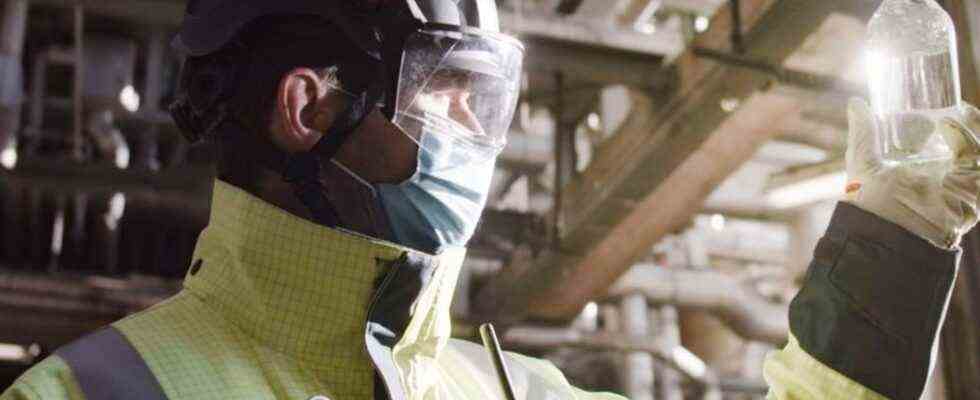energy
BP starts production of bio-fuel for aviation
A BP employee takes a product sample of the finished biokerosene mixture. Photo: BP Europa SE/dpa
© dpa-infocom GmbH
Biodiesel for cars has been around for a long time. Fuel from plant-based raw materials will soon also be used more extensively in air transport. BP is starting industrial production for this in Lower Saxony.
The British mineral oil and energy company BP is now producing aircraft fuel in Emsland with a small proportion of cooking fat residues.
The organic raw materials come from canteens or catering establishments, for example. It’s about used and leftover fats and oils, for example from deep fryers, cooking residues and biomass waste, as a spokesman explained. BP announces the start of production at the Lingen refinery on Monday. According to the company, it is the first plant of this type in Germany that can be used to produce quantities that can be used industrially.
The fats and oils used are mostly of vegetable origin and sometimes also of animal origin. In a closed process, they are combined with the crude oil hydrocarbons for normal kerosene up to the permitted proportion of 5 percent. When burned later, the CO2 emissions of biokerosene are similar to those of purely fossil aviation fuel – because the fat components were already in the material cycle, the overall climate balance should be better.
Fats already in circulation
In contrast to the cultivation of energy crops such as rapeseed or soy for biofuel production, the problem of land competition with food is not acute here either, said a BP representative. “That’s not an issue because the used cooking fats and oils are already in circulation.” For example, certified suppliers of organic raw materials would have to prove that they do not contain palm oil.
There are already customers for the biokerosene – but BP did not want to give any details yet. European board member and refinery manager Arno Appel explained that airlines could use the aviation fuel with fat content “immediately without technical conversion”. The British group is aiming for a global market share of a good fifth.
It was only in October in western Lower Saxony that the then Federal Environment Minister Svenja Schulze (SPD) opened another facility for a better ecological balance in the aviation industry. However, the project of the non-profit climate protection organization Atmosfair in Werlte deals with the production of synthetic kerosene, which should ultimately be completely climate-neutral. Carbon – from the CO2 in the air or waste – and hydrogen – from water split by green electricity – react to form “artificial” fuel. The production quantities here are still relatively small. The first customer is Lufthansa, and Hamburg Airport is supplied.
The big oil and gas companies want to make alternative fuels and the entry into a hydrogen economy a further pillar. They do this to reduce the CO2 emissions from the extraction and burning of fossil raw materials – at the same time, however, investors are increasingly demanding the development of sustainable business models.

